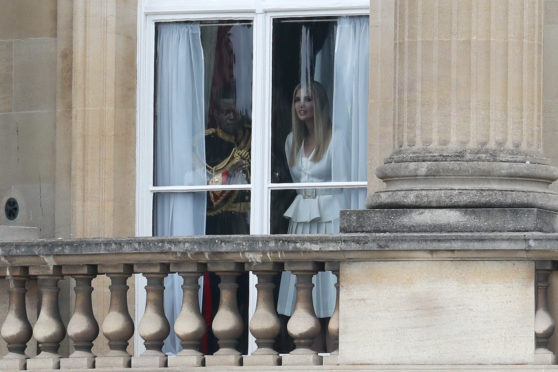This year, my father will have been dead twenty years. I still feel shocked. The original explosion has long gone, but the aftershocks still reverberate through my life.
His space unfilled, his opinion still silently, fruitlessly, sought in my mind. Jumpers. The feel of his trademark woollen jumpers, his arms circling me in a bear hug whenever I returned home, half lifting me off the ground. So real I can hear him. “You need a good steak, girl.”
The loss feels timeless somehow, both yesterday and forever ago. Only the approach of Father’s Day made me count up the years. Well, Father’s Day and a picture of Ivanka Trump looking out the window at Buckingham Palace during the state visit of her old man. The military band playing in president Trump’s honour, apparently included the theme music from “Rocky”. Now, if only the president really was just a B list, more-brawn-than-brain, fantasy figure played by Sylvester Stallone instead of a politician with a nuclear button, we could all sleep a little easier. But what does Ivanka see as she peeps through the curtains?
Something about that picture made me reflect on how scarily important parenthood is. The French philosopher, Foucault, rejected the notion that power is the privilege of a few, suggesting that instead, it, “is everywhere and comes from everywhere”. People, he argued, held power to different degrees in different contexts. How true that is of parenthood. In that, we all have a finger on the nuclear button: the ability to pass on and to shape, to build or destroy, the developing minds of our children.
Girls and their dads. Few could fail to be taken aback by Sylvia Plath’s poem “Daddy”, about her Jewish father Otto Plath, whom she likens to a Nazi.
“Daddy, I have had to kill you, You died before I had time,” she wrote.
Some think it vitriolic but it’s the anguish of the love-hate cocktail that hallmarks it for me, the despair of a girl who could never talk to her “brute” of a father because “the tongue stuck in my jaw”. At 20, Plath tried to kill herself to, “get back, back, back to you. I thought even the bones would do.”
Words shape our world. Just as Plath remembers her inability to speak to her father, I remember the quiet encouragement of mine. He didn’t talk much – my mother did enough for both of them. She was the flighty, colourful butterfly and he was the closed-leaf plant on which she alighted. Intense, interesting, deeply intelligent, he came from real poverty but education changed his life.
“Believe in yourself,“ he told me once, sensing all my insecurities, and the feeling that he thought me worthy of belief burned brightly in me.
When he was terminally ill, he and my mother came to stay for a holiday. I found him one night sitting on his bed and somehow – I forget why – he began talking about his daughters. He had been very lucky, he said. I sensed a quiet message in his words – he was always understated – and I knew that an important opportunity was arising that I could either embrace or avoid.
For once in my life, I didn’t duck. He was lucky because we had been lucky, I told him. We loved him to bits. He didn’t say anything but I saw the emotion in his eyes. When he had gone, that moment was so important to me. The relief of having said what needed to be said.
He left something behind for me. It wasn’t wrapped with a fancy bow but I found it after the door closed on him. It is not unusual for people to embrace creativity after bereavement. Some turn to music, some to art. I turned to words because his death opened something up in me. I wrote my first novel, and though it was not autobiographical, it was imbued with the profound sense of loss that I struggled so hard to cope with. When I look at that book, and the three that followed, I wish so much he could have seen them, but I also see them as his parting gift. “Believe in yourself.”
I cannot read Plath’s poem without feeling lucky. Or, for that matter, watch the supposedly alpha-male Trump, spraying words on his arrival about London’s mayor, Sadiq Khan, and branding him a “stone cold loser”, without thinking of the quiet dignity of my father. Perhaps Ivanka sees something else, something to be proud of, from behind her curtain and I suppose that is as it should be with fathers and daughters.
My favourite story about Father’s Day gifts is from the writer Johann Hari. Apparently, his dad phoned him and said, “Zis present is so good I now think it vas almost vorth having children.” I know what my father gave me, but I wonder sometimes what I gave him. I hope that just as his words so influenced me, mine to him perhaps gave something meaningful back.
Catherine Deveney is an award-winning investigative journalist, novelist and television presenter
